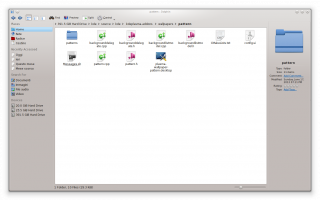Dolphin/ja: Difference between revisions
No edit summary |
(Created page with "== 理念 ==") |
||
| Line 34: | Line 34: | ||
:* [[Special:myLanguage/Dolphin/Batch_Rename|Rename multiple files at the same time]] | :* [[Special:myLanguage/Dolphin/Batch_Rename|Rename multiple files at the same time]] | ||
== | == 理念 == | ||
'''Dolphin''' is a file manager focusing on usability. When reading the term ''Usability'' people often assume that the focus is on newbies and only basic features are offered. This assumption is wrong. | '''Dolphin''' is a file manager focusing on usability. When reading the term ''Usability'' people often assume that the focus is on newbies and only basic features are offered. This assumption is wrong. | ||
Revision as of 00:08, 31 December 2015
 |
使いやすさに注力した、多機能なファイル管理ソフトウェア |
特徴の概要
一見シンプルなファイル管理ソフトウェアに見えますが、実は色々な機能があるのです。以下のようなものなどがあります。
- 分割ウインドウ - 2つのディレクトリを同時に開くことができます
- 表示オプションはウインドウ毎に設定、保存できます
- タブブラウジング
- 右側に情報パネルを表示できます
- あるいはウインドウ内に必要な情報を表示することもできます
- 'パンくずリスト'でナビゲーションを効率化できます
- 1クリックでナビゲーションバーにパスを入力できます
- 伝統的なナビゲーション方法の使えるフォルダーパネルを追加できます
- 今開いているディレクトリで作業できるターミナルをウインドウに追加できます
- 多くの機能がキーボードショートカットで操作できます
チュートリアル
理念
Dolphin is a file manager focusing on usability. When reading the term Usability people often assume that the focus is on newbies and only basic features are offered. This assumption is wrong.
Target User Group
Focusing on usability means that features are discoverable and efficient to use. The feature set is defined indirectly by the target user group of Dolphin:
- Lisa: Lisa is familiar with computers since 10 years. Due to her job she has experience with Word, Excel and Outlook. At home she mainly uses the computer for browsing the web and writing e-mails. She requires a file manager for managing photos from the camera, documents she gets per e-mail or PDF-documents she downloads with a browser. Lisa knows concepts like folders and a file hierarchy, but she is not familiar with the file hierarchy of Linux.
- Simon: Simon has been a developer at a software company for 8 years. At home he uses a file manager to maintain his large collection of photos and music. Additionally he owns a small homepage and needs to transfer updated files on the FTP server. Moving and copying files are regular tasks in Simon's workflow.
Not part of the target user group of Dolphin are Fred and Jeff:
- Fred: Fred is 75 years old and is able to write e-mails and browsing the web. He is not familiar with file hierarchies and stores all his documents on the desktop.
- Jeff: Jeff is Linux-freak since the age of 16 a few years ago. He is developer and in his spare time he acts as administrator for a small company. Jeff has two monitors to keep the overview about his huge number of opened applications.
This does not mean that Fred or Jeff cannot work with Dolphin. But there might be features and concepts of Dolphin that overburden Fred. Also Jeff might miss some features which are a must-have for his daily work.
Non-Intrusive Features
Before a feature is added in Dolphin, it is checked whether the feature is mandatory for the target user group. If this is not the case, then this does not mean that the feature cannot be added; first it must be clarified whether the feature might be non-intrusive, so that it adds value for users outside the primary target user group of Dolphin. Non-intrusive is mainly related to the user interface. A feature that adds a lot of clutter to the main menu, context menus or toolbar might harm the target user group. In this case the feature will not be added.
A good example of a feature that is non-intrusive is the embedded terminal in Dolphin. It only requires one entry inside a sub menu, but adds great value for Jeff, who is not part of the target user group.
Options
Options are mandatory as the user "average Joe" does not exist. Still it is not the goal of Dolphin offering options for all kind of things. Again the focus is on the possible needs of the target user group. Each additional option makes it harder finding other options, so the same rules for features are applied to options too.
ヒントとトラブルシューティング
Problem: Dolphin's menu entries and/or don't have any options. Nepomuk is enabled in System Settings.
- Solution: Rename the folder ~/.kde4/share/apps/dolphin (in some distros it will be ~/.kde/share/apps/dolphin) and restart dolphin. This will purge your dolphin customizations but the entries should be back. If everything works as expected you can then delete the folder. This happened to me after an upgrade from KDE 4.4 to 4.5
Problem: When I choose the application to open a specific filetype with, it seems to affect other filetypes too. It’s like Dolphin cannot tell the difference between the two different filetypes.
- Solution: Probably the KDE platform does not know about one of the two filetypes, so it associates the filetype to a different, known filetype. This is common with XML-based filetypes; even if they use a file extension of their own (e.g. .xliff or .graphml), if they are not a filetype known by the KDE platform, they will be treated as any other XML file, and opened with the default application to open XML files.
- To solve this issue, you can use File Associations to create an entry for the unrecognized filetype.
Also see forums and the Dolphin Handbook.
キーワード
ファイル管理, ファイル マネージャー, ファイル ブラウザー, メタデータ, Nepomuk
